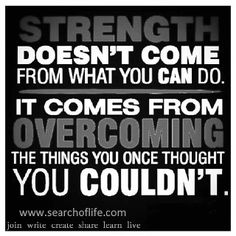 Some ten years ago I learned a valuable way of looking at making life meaningful, or living a meaningful life. The teacher suggested that we pick a horizon, a direction, and then look what’s blocking the way of getting there.
Some ten years ago I learned a valuable way of looking at making life meaningful, or living a meaningful life. The teacher suggested that we pick a horizon, a direction, and then look what’s blocking the way of getting there.
Since then I saw that even seeing the horizon is blocked… Blocked by seven boulders, lined up one behind the other, blocking your view, blocking your movement.
So, in my coaching practice, when I ask people to set a direction, and they can’t see any, I am inclined to suggest that they choose the direction: living a meaningful live, or a fulfilled life… without specifying what it is.
The goal is to see the first boulder that blocks your view, that blocks your path.
It is always and ultimately your soul correction, a character flaw, a character defect, that is the first boulder blocking your view and path to a meaningful life.
The second question is: what can you do to eliminate the boulder? You can’t go around it, above it, or under it: you need to eliminate it.
Without eliminating the character flaw, your access to a meaningful life is blocked.
How to use deliberate practice to eliminate the stumbling blocks the soul correction puts in your way?
You can use deliberate practice for a lot of things, especially to become an expert.
But most people are not “prospects” to be trained to be experts. But why?
 Some inherent, or seemingly inherent character defect prevents them from even getting into the game of life, fully.
Some inherent, or seemingly inherent character defect prevents them from even getting into the game of life, fully.
Soul correction is an inherent character defect, an inherent world view, mindset, that unless it is corrected, results in the person living a sub standard life, a life of quiet desperation.
From the person’s point of view, the purpose of life is to overcome and correct this character defect, so they can live a meaningful life.
 A meaningful life is not possible without doing something meaningful. And doing something meaningful requires effort, requires getting better at that all the time, so there is a sense of accomplishment with the accompanying pride and pleasure.
A meaningful life is not possible without doing something meaningful. And doing something meaningful requires effort, requires getting better at that all the time, so there is a sense of accomplishment with the accompanying pride and pleasure.
In the next part of this article, I will highlight a few different ways your soul correction may rob you of a chance for a meaningful life.
Sporadic efforts won’t change the character defect, because the character defect is on the level of the genes. The efforts needs to be concerted, ongoing, and deliberate.
What is deliberate?
Deliberate means: done consciously and intentionally.
“a deliberate attempt to provoke conflict”
synonyms: intentional, calculated, conscious, intended, planned, studied, knowing, willful, purposeful, purposive, premeditated, preplanned.
In addition to the practice being deliberate, there are two additional elements, that without them the practice will not bring the desired result: character defect neutralized.
Being able to see patterns is one of the additional elements. Being able to see the behavior, it’s elements, it’s triggers as patterns, and the counter measures as patterns you design.
Being able to see and create patterns is an intangible capacity, that with enough practice turns on by itself, but when you want to deal with your soul correction character defect, not having the capacity creates a catch 22 situation. I have been able to turn on the capacity successfully for people, and the difference in their behavior, what they see and notice is dramatic. I don’t use this word often: actually this has been the most dramatic of all capacities.
The second needed capacity you’ll need to cause lasting and maybe permanent correction of these character defects is the capacity of being able to create a mental representation, a detailed image of the result you seek: a life not hindered by the character defect, the new behavior in the trigger situations.
This is also a capacity, and I haven’t worked with anyone who has it, and I haven’t turned it on for anyone.
I see it sorely missing. If you don’t know where you are going, you’ll not get there, you’ll not see how far you are from it, you won’t see your errors.
Now, let’s look at some character defects that I can see can be corrected with deliberate practice, and a shift in how you look at them:
- One type of character defect is a click-whirr automatic behavior when a certain feeling arises.
It comes up quickly, like a lightening, and the person reacts with running or deer in the headlight paralysis.
An otherwise glib or talkative person becomes mute, starts crying, becomes stupid.
We could call this a conditioned reflex, like a phobia.
If it is like a phobia, then it needs to be treated like a phobia. The treatment of phobia is desensitizing.
Gradually, with deliberate practice, the person exposes themselves to the trigger, and gradually can stand and “survive” the trigger without going to their usual reflex behavior, running, crying, leaving.
While I was researching methods to overcome, one expert said something remarkable:
Panic and Anxiety Are Addictions.
Panic is a powerful manipulator. It uses its force to trick you into doing what it wants so you can make it stronger and stronger, all while thinking you’re doing what is necessary to stop it in its tracks.
The first trick that panic plays is trying to get you to figure out what is causing it. As soon as you have your first panic attack, your mind struggles to figure out what happened. If you can’t come up with a good reason for your anxiety (like an accident, a robbery or something even worse), than your mind will make one up.
Just reading these few paragraphs, I see that the selfish gene is involved in this conditioned reflex…
Luckily we can change. We can change our brain, because it is plastic, and we can change our behavior.
I used to have a behavior similar to this. It said: “I can’t.”
It came up often enough to be undeniable. The feeling was a pressing feeling in the chest, wide, from underarm to underarm.
Surprisingly, just writing “I can’t” the whole feeling is there… even though it hasn’t been there now for a long time, maybe decades.
Once I realized that it was an automatic feeling, I countered it with an argument: how would you know it?
Because, after all, you don’t know what you can and what you can’t, until you sincerely attempt to do it.
The argument relieved the feeling enough that I could actually ask the question: How can I do it?
In my case, I made that a habit, until the paralyzing panic reaction stopped coming on altogether, although, as I have just proved, I can bring it on just by saying “I can’t.”
It’s like the patient who complains that when he hits his hand it hurts… The doctor says: don’t hit it. Duh.
-
Considering yourself the judge
Another type of character defect is to interface with the world and with others on the basis of what is wrong with them.
You go around as if it were your assignment to point out, at least in your head, what is wrong with people, what is wrong with life, what is wrong with you.The hidden purpose is that you feel superior in the sea of inferior people, and you don’t have to be better, improve, learn, respect people, appreciate them for who they are or what they do…
And because you are both the judge and the judged… you’ll not stop judging, and that is all there is… no improvement, no change, because what would you do if there were nothing to judge?!
Once you treat this as an addiction, a pleasure/pain causing strategy to avoid work… you’ll be on your way to eliminating it.
- Character defect: defensive
For this character defect person everything looks like an attack.
So depending on their constitution, they will attack, or they will justify and explain.
What’s the inner dynamic? Even though they may see that they have shortcomings, they don’t want anyone else to know it or point it out.
They don’t want to have to face their errors in thinking, they don’t want anyone be more powerful, they want to be the peak of creation, even though they are mostly slothful, and major in minors… i.e. spend most of their time with insignificant activities, socializing, helping, etc.
Definitely an addictive behavior, avoiding the effort it would take to change, to do something that is hard.
- Character defect: blaming
Not surprisingly, this is also a strategy to avoid doing any work. This one is the hardest to correct, because the whole life is based on the fact that it is someone else’s fault that they are not…. that they didn’t…. that they can’t….
- Character defect: arrogance
Interestingly this is a trust issue. No one can be trusted to give me the knowledge I need, because people are not trustworthy… This character defect is very forceful: the job is to weaken it.
In my own practice, I have found that saying: It ain’t necessarily so, opens up malleability ((the opposite of rigid or fixed)), and the ability to look again. Often that is all it takes to let go of the “I know everything” attitude, and see what you don’t know, and be able to learn.
- Character defect: self-delusional
Thinking oneself superior or thinking oneself inferior are both strategies to avoid doing much of anything.
- Character defect: aggressive, self righteous
This type of person believes that they know, hear and see things accurately, and from that vantage point their behavior is appropriate and justified.
Once they discover that in fact they don’t see, know, and hear things accurately, they gain a chance to work on this soul correction.
- Character defect: “I already know”
Stuck in arrogance. But here, arrogance is a tool to avoid going anywhere where you can fail. Avoid working hard. Avoid putting out. The underlying fear is fear of death. This is the most similar in correction to the panic attack I dealt with in detail above.
So, now that you have found your character defect that you can see may stand in the way of you living a meaningful life, what can you do? What should you do?
- Find out what is your soul correction. It is a lot like horoscope: it is calculated from your date of birth.
- Start observing your behavior, and recognizing the pattern of the character defect
- If you can’t see the character defect, you may need to have the “Patterns” capacity activated
- If you see it, decide if it is worth your while to spend time and energy on correcting the character defect. Decide if a meaningful life is prize enough for you. It may not be.
- If your decision is to correct it, find a coach who is familiar with deliberate practice, creating a mental representation, and patterns. Start working with them.
- Alternatively, you can read the Peak, the new science of expertise (pdf and kindle in my subscribers area) and start working on your own, or with me.
- I am a coach, but at this point I can’t call myself an expertise coach. I consider myself a coach in training.
But I can do what no other person on the planet can do: I can turn on the missing capacities for you.
Contact me if you want to work with me. If you are already in my coaching program, I will start incorporating this method and purpose into your program.
[si-contact-form form=’4′]
Useful reading: https://victorliew.quora.com/Deliberate-practice-Talent-is-overrated
Read the original article: What if you have something blocking you from growing? The Seven Boulders principle
